- Home
- Raymond E. Feist
Book 1 - Magician Page 2
Book 1 - Magician Read online
Page 2
Once before the door, the man stood to one side and said, “You go in, boy. I must dress the pig.”
Nodding dumbly, Pug pushed open the wooden door and stepped in.
“Close that door, boy! You’ll give me a chill and cause me my death.”
Pug jumped to obey, slamming the door harder than he intended.
He turned, taking in the scene before him. The interior of the cottage was a small single room. Against one wall was the fireplace, with a good-size hearth before it. A bright, cheery fire burned, casting a warm glow. Next to the fireplace a table sat, behind which a heavyset, yellow-robed figure rested on a bench. His grey hair and beard nearly covered his entire head, except for a pair of vivid blue eyes that twinkled in the firelight. A long pipe emerged from the beard, producing heroic clouds of pale smoke.
Pug knew the man. “Master Kulgan . . . ,” he began, for the man was the Duke’s magician and adviser, a familiar face around the castle keep.
Kulgan leveled a gaze at Pug, then said in a deep voice, given to rich rolling sounds and powerful tones, “So you know me, then?”
“Yes, sir. From the castle.”
“What is your name, boy from the keep?”
“Pug, Master Kulgan.”
“Now I remember you.” The magician absently waved his hand. “Do not call me ‘Master,’ Pug—though I am rightly called a master of my arts,” he said with a merry crinkling around his eyes. “I am higher-born than you, it is true, but not by much. Come, there is a blanket hanging by the fire, and you are drenched. Hang your clothes to dry, then sit there.” He pointed to a bench opposite him.
Pug did as he was bid, keeping an eye on the magician the entire time. He was a member of the Duke’s court, but still a magician, an object of suspicion, generally held in low esteem by the common folk. If a farmer had a cow calve a monster, or blight strike the crops, villagers were apt to ascribe it to the work of some magician lurking in nearby shadows. In times not too far past they would have stoned Kulgan from Crydee as like as not. His position with the Duke earned him the tolerance of the townsfolk now, but old fears died slowly.
After his garments were hung, Pug sat down. He started when he saw a pair of red eyes regarding him from just beyond the magician’s table. A scaled head rose up above the tabletop and studied the boy.
Kulgan laughed at the boy’s discomfort. “Come, boy. Fantus will not eat you.” He dropped his hand to the head of the creature, who sat next to him on his bench, and rubbed above its eye ridges. It closed its eyes and gave forth a soft crooning sound, not unlike the purring of a cat.
Pug shut his mouth, which had popped open with surprise, then asked, “Is he truly a dragon, sir?”
The magician laughed, a rich, good-natured sound. “Betimes he thinks he is, boy. Fantus is a firedrake, cousin to the dragon, though of smaller stature.” The creature opened one eye and fastened it on the magician “But of equal heart,” Kulgan quickly added, and the drake closed his eye again. Kulgan spoke softly, in conspiratorial tones. “He is very clever, so mind what you say to him. He is a creature of finely fashioned sensibilities.”
Pug nodded that he would. “Can he breathe fire?” he asked, eyes wide with wonder. To any boy of thirteen, even a cousin to a dragon was worthy of awe.
“When the mood suits him, he can belch out a flame or two, though he seems rarely in the mood. I think it is due to the rich diet I supply him with, boy. He has not had to hunt for years, so he is something out of practice in the ways of drakes. In truth, I spoil him shamelessly.”
Pug found the notion somehow reassuring. If the magician cared enough to spoil this creature, no matter how outlandish, then he seemed somehow more human, less mysterious. Pug studied Fantus, admiring how the fire brought golden highlights to his emerald scales. About the size of a small hound, the drake possessed a long, sinuous neck atop which rested an alligatorlike head. His wings were folded across his back, and two clawed feet extended before him, aimlessly pawing the air, while Kulgan scratched behind bony eye ridges. His long tail swung back and forth, inches above the floor.
The door opened and the big bowman entered, holding a dressed and spitted loin of pork before him. Without a word he crossed to the fireplace and set the meat to cook. Fantus raised his head, using his long neck to good advantage to peek over the table. With a flick of his forked tongue, the drake jumped down and, in stately fashion, ambled over to the hearth. He selected a warm spot before the fire and curled up to doze away the wait before dinner.
The franklin unfastened his cloak and hung it on a peg by the door “Storm will pass afore dawn, I’m thinking.” He returned to the fire and prepared a basting of wine and herbs for the pig. Pug was startled to see a large scar that ran down the left side of the man’s face, showing red and angry in the firelight.
Kulgan waved his pipe in the franklin’s direction. “Knowing my tight-lipped man here, you’ll not have made his proper acquaintance. Meecham, this boy is Pug, from the keep at Castle Crydee.” Meecham gave a brief nod, then returned to tending the roasting loin.
Pug nodded back, though a bit late for Meecham to notice. “I never thought to thank you for saving me from the boar.”
Meecham replied, “There’s no need for thanks, boy. Had I not startled the beast, it’s unlikely it would have charged you.” He left the hearth and crossed over to another part of the room, took some brown dough from a cloth-covered bucket, and started kneading.
“Well, sir,” said Pug to Kulgan, “it was his arrow that killed the pig. It was indeed fortunate that he was following the animal.”
Kulgan laughed. “The poor creature, who is our most welcome guest for dinner, happened to be as much a victim of circumstance as yourself.”
Pug looked perplexed. “I don’t follow, sir.”
Kulgan stood and took down an object from the topmost shelf on his bookcase and placed it on the table before the boy. It was wrapped in a cover of dark blue velvet, so Pug knew at once it must be a prize of great value for such an expensive material to be used for covering Kulgan removed the velvet, revealing an orb of crystal that gleamed in the firelight. Pug gave an ah of pleasure at the beauty of it, for it was without apparent flaw and splendid in its simplicity of form.
Kulgan pointed to the sphere of glass. “This device was fashioned as a gift by Althafain of Carse, a most puissant artificer of magic, who thought me worthy of such a present, as I have done him a favor or two in the past—but that is of little matter. Having just this day returned from the company of Master Althafain, I was testing his token. Look deep into the orb, Pug.”
Pug fixed his eyes on the ball and tried to follow the flicker of firelight that seemed to play deep within its structure. The reflections of the room, multiplied a hundredfold, merged and danced as his eyes tried to fasten upon each aspect within the orb. They flowed and blended, then grew cloudy and obscure. A soft white glow at the center of the ball replaced the red of firelight, and Pug felt his gaze become trapped by its pleasing warmth. Like the warmth of the kitchen at the keep, he thought absently.
Suddenly the milky white within the ball vanished, and Pug could see an image of the kitchen before his eyes. Fat Alfan the cook was making pastries, licking the sweet crumbs from his fingers. This brought the wrath of Megar, the head cook, down upon his head, for Megar considered it a disgusting habit. Pug laughed at the scene, one he had witnessed before many times, and it vanished. Suddenly he felt tired.
Kulgan wrapped the orb in the cloth and put it away. “You did well, boy,” he said thoughtfully. He stood watching the boy for a moment, as if considering something, then sat down. “I would not have suspected you of being able to fashion such a clear image in one try, but you seem to be more than you first appear to be.”
“Sir?”
“Never mind, Pug.” He paused for a moment, then said, “I was using that toy for the first time, judging how far I could send my sight, when I spied you making for the road. From your limp and bruised conditi
on, I judged that you would never reach the town, so I sent Meecham to fetch you.”
Pug looked embarrassed by the unusual attention, color rising to his cheeks. He said, with a thirteen-year-old’s high estimation of his own ability, “You needn’t have done that, sir. I would have reached the town in due time.”
Kulgan smiled. “Perhaps, but then again, perhaps not. The storm is unseasonably severe and perilous for traveling.”
Pug listened to the soft tattoo of rain on the roof of the cottage. The storm seemed to have slackened, and Pug doubted the magician’s words. As if reading the boy’s thought, Kulgan said, “Doubt me not, Pug This glade is protected by more than the great boles. Should you pass beyond the circle of oaks that marks the edge of my holding, you would feel the storm’s fury. Meecham, how do you gauge this wind?”
Meecham put down the bread dough he was kneading and thought for a moment. “Near as bad as the storm that beached six ships three years back.” He paused for a moment, as if reconsidering the estimate, then nodded his endorsement. “Yes, nearly as bad, though it won’t blow so long.”
Pug thought back three years to the storm that had blown a Quegan trading fleet bound for Crydee onto the rocks of Sailor’s Grief. At its height, the guards on the castle walls were forced to stay in the towers, lest they be blown down. If this storm was that severe, then Kulgan’s magic was impressive, for outside the cottage it sounded no worse than a spring rain.
Kulgan sat back on the bench, occupied with trying to light his extinguished pipe. As he produced a large cloud of sweet white smoke, Pug’s attention wandered to a case of books standing behind the magician. His lips moved silently as he tried to discern what was written on the bindings, but could not.
Kulgan lifted an eyebrow and said, “So you can read, aye?”
Pug started, alarmed that he might have offended the magician by intruding on his domain. Kulgan, sensing his embarrassment, said, “It is all right, boy. It is no crime to know letters.”
Pug felt his discomfort diminish. “I can read a little, sir. Megar the cook has shown me how to read the tallies on the stores laid away for the kitchen in the cellars. I know some numbers, as well.”
“Numbers, too,” the magician exclaimed good-naturedly. “Well, you are something of a rare bird.” He reached behind himself and pulled out one volume, bound in red-brown leather, from the shelf. He opened it, squinting at one page, then another, and at last found a page that seemed to meet his requirements. He turned the open book around and lay it upon the table before Pug. Kulgan pointed to a page illuminated by a magnificent design of snakes, flowers, and twining vines in a colorful design around a large letter in the upper left corner. “Read this, boy.”
Pug had never seen anything remotely like it. His lessons had been on plain parchment with letters fashioned in Megar’s blunt script, using a charcoal stick. He sat, fascinated by the details of the work, then realized the magician was staring at him. Regaining his wits, he began to read.
“And then there came a sum . . . summons from . . .” He looked at the word, stumbling over the complex combinations that were new to him. “. . . Zacara.” He paused, looking at Kulgan to see if he was correct. The magician nodded for him to continue. “For the north was to be forgot . . . forgotten, lest the heart of the empire Ian . . . languish and all be lost. And though of Bosania from birth, those soldiers still were loyal to Great Kesh in their service. So for her great need, they took up their arms and put on their armor and quit Bosania, taking ship to the south, to save all from destruction.”
Kulgan said, “That’s enough,” and gently closed the cover of the book. “You are well gifted with letters for a keep boy.”
“This book, sir, what is it?” asked Pug, as Kulgan took it from him. “I have never seen anything like it.”
Kulgan looked at Pug for a moment, with a gaze that made him uncomfortable again, then smiled, breaking the tension. As he put the book back, he said, “It is a history of this land, boy. It was given as a gift by the abbot of an Ishapian monastery. It is a translation of a Keshian text, over a hundred years old.”
Pug nodded and said, “It all sounded very strange. What does it tell of?”
Kulgan once more looked at Pug as if trying to see something inside of the boy, then said, “A long time ago, Pug, all these lands, from the Endless Sea across the Grey Tower Mountains to the Bitter Sea, were part of the Empire of Great Kesh. Far to the east existed a small kingdom, on one small island called Rillanon. It grew to engulf its neighboring island kingdoms, and it became the Kingdom of the Isles. Later it expanded again to the mainland, and while it is still the Kingdom of Isles, most of us simply call it ‘the Kingdom.’ We, who live in Crydee, are part of the Kingdom, though we live as far from the capital city of Rillanon as one can and still be within its boundaries.
“Once, many long years ago, the Empire of Great Kesh abandoned these lands, for it was engaged in a long and bloody conflict with its neighbors to the south, the Keshian Confederacy.”
Pug was caught up in the grandeur of lost empires, but hungry enough to notice Meecham was putting several small loaves of dark bread in hearth oven. He turned his attention back to the magician. “Who were the Keshian Con— . . . ?”
“The Keshian Confederacy,” Kulgan finished for the boy. “It is a group of small nations who had existed as tributaries to Great Kesh for centuries. A dozen years before that book was written, they united against their oppressor. Each alone was insufficient to contest with Great Kesh, but united they proved its match. Too close a match, for the war dragged on year after year. The Empire was forced to strip its northern provinces of their legions and send them south, leaving the north open to the advances of the new, younger Kingdom.
“It was Duke Borric’s grandfather, youngest son of the King, who brought the army westward, extending the Western Realm. Since then all of what was once the old imperial province of Bosania, except for the Free Cities of Natal, has been called the Duchy of Crydee.”
Pug thought for a moment, then said, “I think I would like to travel to this Great Kesh someday.”
Meecham snorted, something close to a laugh. “And what would you be traveling as, a freebooter?”
Pug felt his face flush. Freebooters were landless men, mercenaries who fought for pay, and who were regarded as being only one cut above outlaws.
Kulgan said, “Perhaps you might someday, Pug. The way is long and full of peril, but it is not unheard of for a brave and hearty soul to survive the journey. Stranger things have been known to happen.”
The talk at the table turned to more common topics, for the magician had been at the southern keep at Carse for over a month and wanted the gossip of Crydee. When the bread was done baking, Meecham served it hot, carved the pork loin, and brought out plates of cheese and greens. Pug had never eaten so well in his life. Even when he had worked in the kitchen, his position as keep boy earned him only meager fare. Twice during dinner, Pug found the magician regarding him intently.
When the meal was over, Meecham cleared the table, then began washing the dishes with clean sand and fresh water, while Kulgan and Pug sat talking. A single scrap of meat remained on the table, which Kulgan tossed over to Fantus, who lay before the fire. The drake opened one eye to regard the morsel. He pondered the choice between his comfortable resting place and the juicy scrap for a moment, then moved the necessary six inches to gulp down the prize and closed his eye again.
Kulgan lit his pipe, and once he was satisfied with its production of smoke, he said, “What are your plans when you reach manhood, boy?”
Pug was fighting off sleep, but Kulgan’s question brought him alert again. The time of Choosing, when the boys of the town and keep were taken into apprenticeship, was close, and Pug became excited as he said, “This Midsummer’s Day I hope to take the Duke’s service under Swordmaster Fannon.”
Kulgan regarded his slight guest. “I would have thought you still a year or two away from apprenticeship, Pug
.”
Meecham gave out a sound somewhere between a laugh and a grunt. “Bit small to be lugging around sword and shield, aren’t you, boy?”
Pug flushed. He was the smallest boy of his age in the castle. “Megar the cook said I may be late coming to my growth,” he said with a faint note of defiance. “No one knows who my parents were, so they have no notion of what to expect.”
“Orphan, is it?” asked Meecham, raising one eyebrow, his most expressive gesture yet.
Pug nodded. “I was left with the Priests of Dala, in the mountain abbey, by a woman who claimed she found me in the road. They brought me to the keep, for they had no way to care for me.”
“Yes,” injected Kulgan, “I remember when those who worship the Shield of the Weak first brought you to the castle. You were no more than a baby fresh from the teat. It is only through the Duke’s kindness that you are a freeman today. He felt it a lesser evil to free a bondsman’s son than to bond a freeman’s. Without proof, it was his right to have you declared bondsman.”
Meecham said in a noncommittal tone, “A good man, the Duke.”
Pug had heard the story of his origin a hundred times before from Magya in the kitchen of the castle. He felt completely wrung out and could barely keep his eyes open. Kulgan noticed and signaled Meecham. The tall franklin took some blankets from a shelf and prepared a sleeping pallet. By the time he finished, Pug had fallen asleep with his head on the table. The large man’s hands lifted him gently from the stool and placed him on the blankets, then covered him.

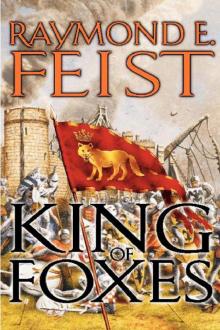 King of Foxes
King of Foxes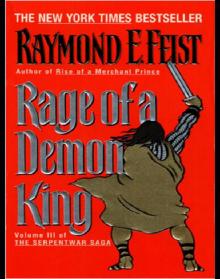 Rage of a Demon King
Rage of a Demon King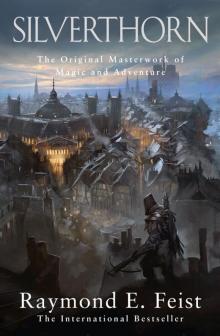 Silverthorn
Silverthorn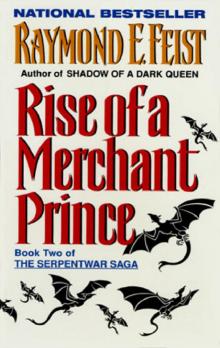 Rise of a Merchant Prince
Rise of a Merchant Prince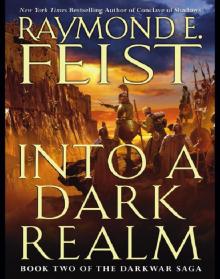 Into a Dark Realm: Book Two of the Darkwar Saga
Into a Dark Realm: Book Two of the Darkwar Saga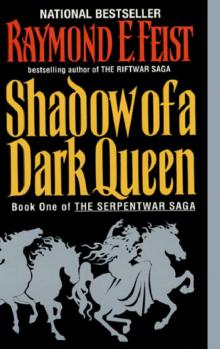 Shadow of a Dark Queen
Shadow of a Dark Queen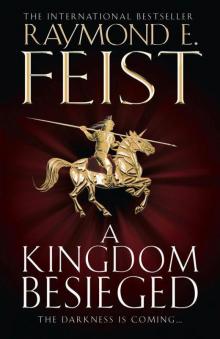 A Kingdom Besieged
A Kingdom Besieged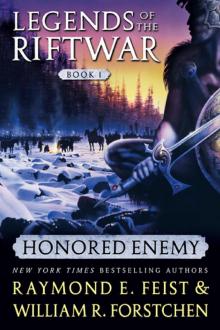 Honored Enemy
Honored Enemy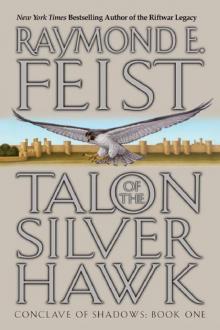 Talon of the Silver Hawk
Talon of the Silver Hawk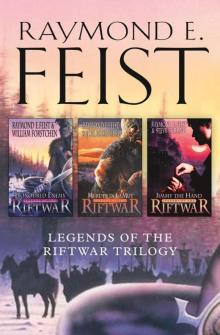 The Complete Legends of the Riftwar Trilogy
The Complete Legends of the Riftwar Trilogy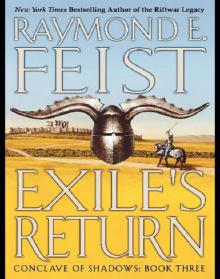 Exile's Return: Conclave of Shadows: Book Three
Exile's Return: Conclave of Shadows: Book Three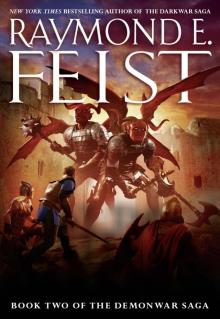 At the Gates of Darkness
At the Gates of Darkness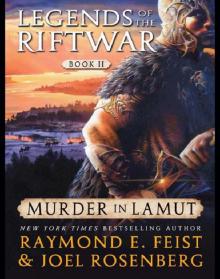 Murder in LaMut: Legends of the Riftwar: Book II
Murder in LaMut: Legends of the Riftwar: Book II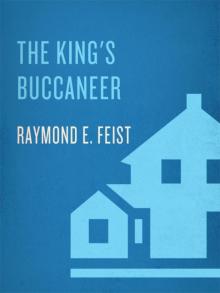 The King's Buccaneer
The King's Buccaneer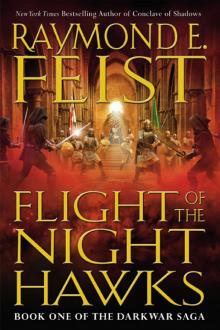 Flight of the Nighthawks
Flight of the Nighthawks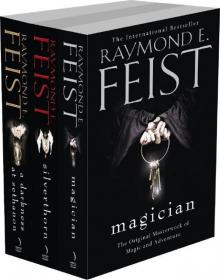 The Riftwar Saga
The Riftwar Saga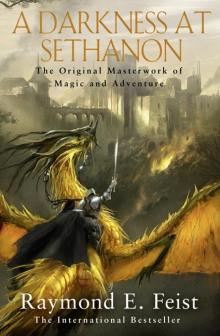 A Darkness at Sethanon
A Darkness at Sethanon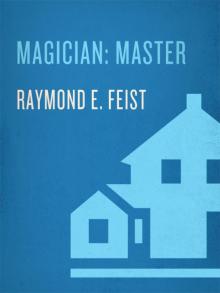 Magician: Master
Magician: Master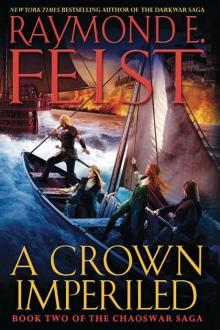 A Crown Imperiled
A Crown Imperiled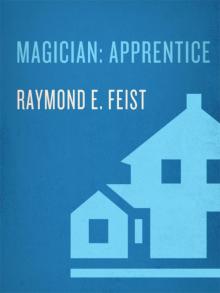 Magician: Apprentice
Magician: Apprentice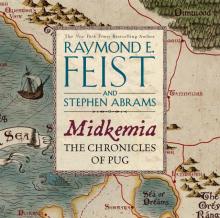 Midkemia
Midkemia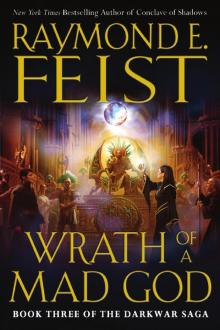 Wrath of a Mad God
Wrath of a Mad God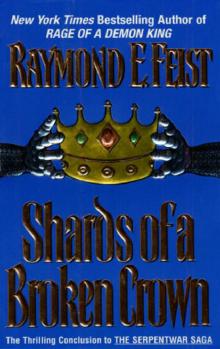 Shards of a Broken Crown
Shards of a Broken Crown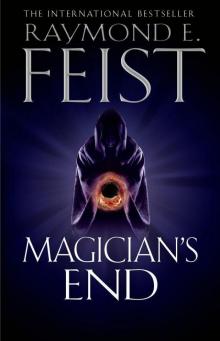 Magician's End
Magician's End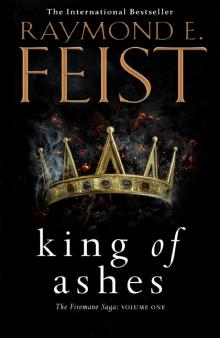 King of Ashes
King of Ashes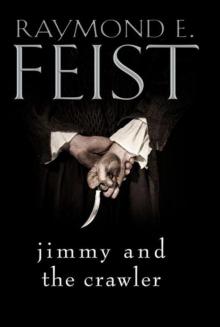 Jimmy and the Crawler
Jimmy and the Crawler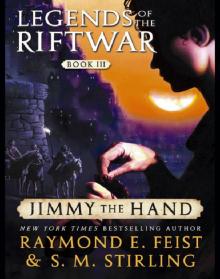 Jimmy the Hand: Legends of the Riftwar, Book 3
Jimmy the Hand: Legends of the Riftwar, Book 3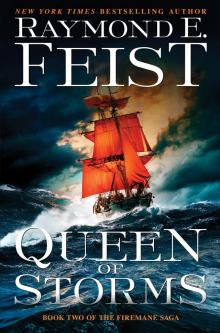 Queen of Storms
Queen of Storms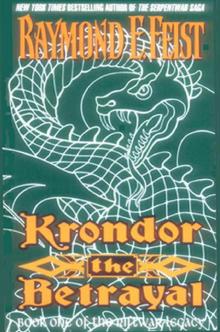 Krondor: The Betrayal
Krondor: The Betrayal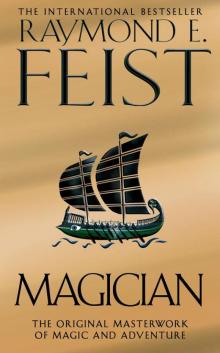 Magician
Magician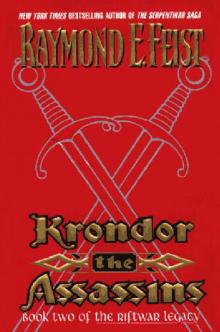 Krondor: The Assassins
Krondor: The Assassins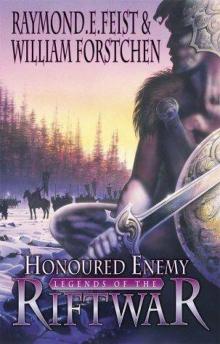 Honoured Enemy
Honoured Enemy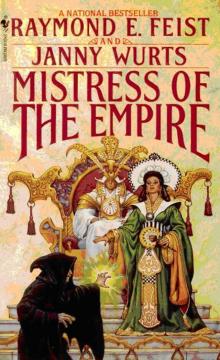 Mistress of the Empire
Mistress of the Empire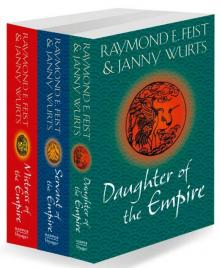 The Complete Empire Trilogy
The Complete Empire Trilogy Legends 1 - Honoured Enemy
Legends 1 - Honoured Enemy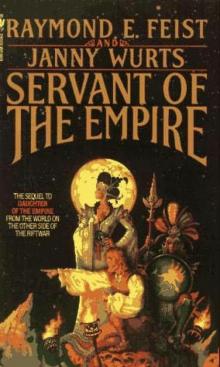 Empire - 02 - Servant Of The Empire
Empire - 02 - Servant Of The Empire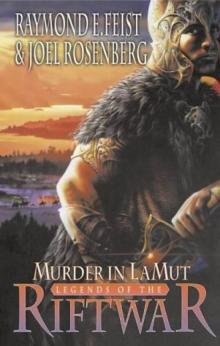 Murder In LaMut
Murder In LaMut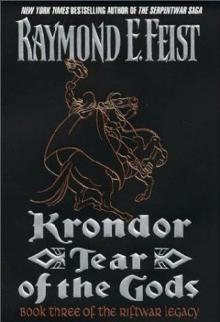 Krondor Tear of the Gods
Krondor Tear of the Gods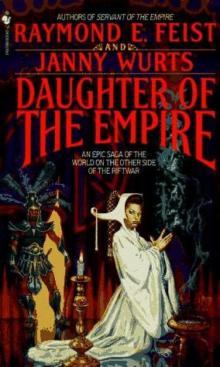 Empire - 01 - Daughter Of The Empire
Empire - 01 - Daughter Of The Empire![King of Ashes [Book One] Read online](http://i1.bookreadfree.com/i1/03/30/king_of_ashes_book_one_preview.jpg) King of Ashes [Book One]
King of Ashes [Book One]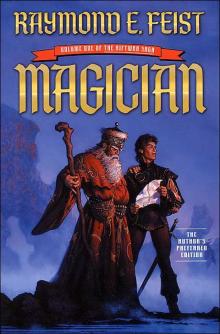 Magician (10th Aniversary Edition)
Magician (10th Aniversary Edition)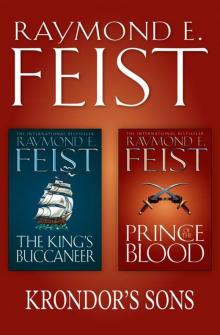 Prince of the Blood, the King's Buccaneer
Prince of the Blood, the King's Buccaneer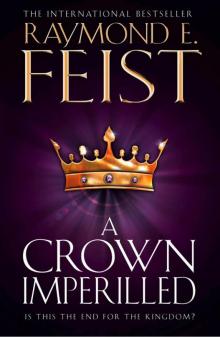 A Crown Imperilled cs-2
A Crown Imperilled cs-2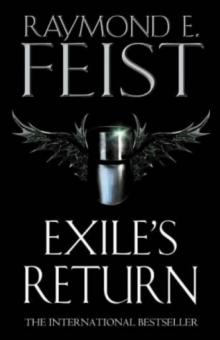 Exile's Return
Exile's Return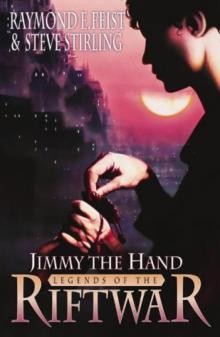 Jimmy the Hand
Jimmy the Hand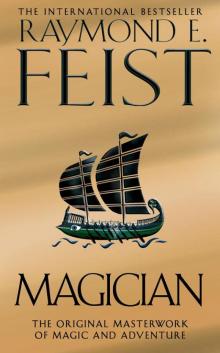 Book 1 - Magician
Book 1 - Magician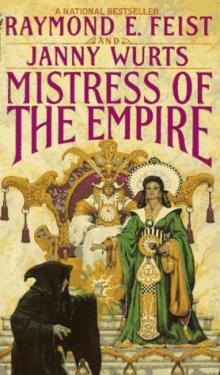 Empire - 03 - Mistress Of The Empire
Empire - 03 - Mistress Of The Empire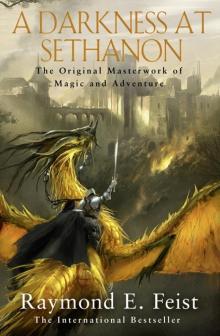 Darkness at Sethanon
Darkness at Sethanon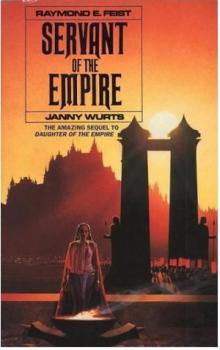 Servant of the Empire
Servant of the Empire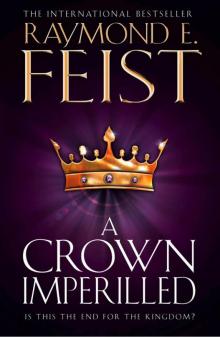 A Crown Imperilled
A Crown Imperilled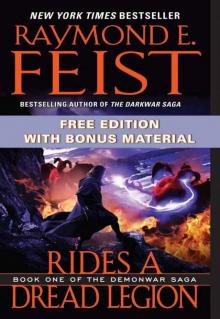 Rides a Dread Legion
Rides a Dread Legion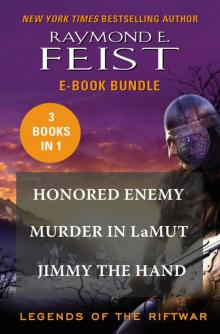 Legends of the Riftwar
Legends of the Riftwar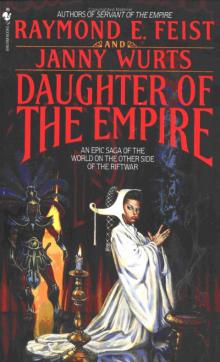 Daughter of the Empire
Daughter of the Empire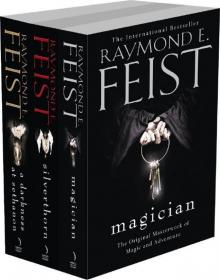 The Riftwar Saga Trilogy: Magician, Silverthorn and A Darkness at Sethanon
The Riftwar Saga Trilogy: Magician, Silverthorn and A Darkness at Sethanon